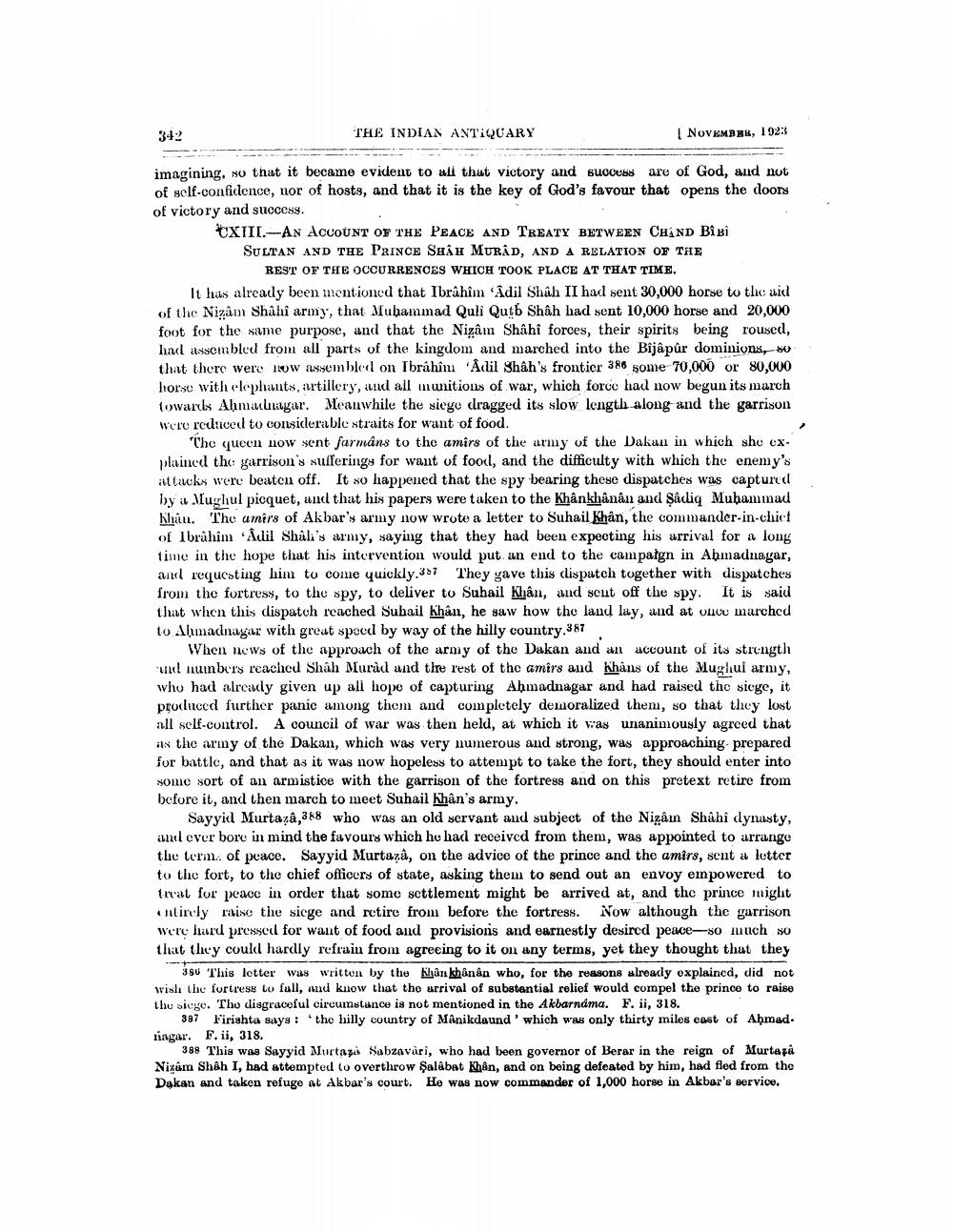________________
342
THE INDIAN ANTIQUARY
NOVEMBRE, 1923
imagining, so that it became evident to all that victory and suooebis are of God, and not of self-confidence, nor of hosts, and that it is the key of God's favour that opens the doors of victory and success.
XIII.-AN ACCOUNT OF THE PEACE AND TREATY BETWEEN CHAND Bibi SULTAN AND THE PRINCE SHẢH MURAD, AND A RELATION OF THE
REST OF THE OCCURRENCES WHICH TOOK PLACE AT THAT TIME. It has already been mentioned that Ibrahîm Adil Shâh II had sent 30,000 horse to the aid of the Nizâm Shâhî army, that Muhammad Quli Qutb Shâh had sent 10,000 horse and 20,000 foot for the same purpose, and that the Nizâm Shâhî forces, their spirits being roused, had assembled from all parts of the kingdom and marched into the Bijapur dominions, 60 that there were HOW assembled on Ibrahîm Adlil Shah's frontier 386 some 70,000 or 80,000 horse with elephants, utillery, and all munitions of war, which foruc had now begun its march towards Ahmadgar. Meanwhile the siege dragged its slow length along and the garrison were reduced to considerable straits for want of food.
'The queen now sent farmáns to the amirs of the army of the Dakun in which sho explained the garrison's mullering for want of food, and the difficulty with which the enemy's attacks were beaten off. It so happened that the spy bearing these dispatches was captured by uglul picquet, and that his papers were taken to the Khânkhânån and Sadiq Muhammad Nhân. The amirs of Akbar's army now wrote a letter to Suhail Khân, the commander-in-chich of Ibrahîm Adlil Shâli's army, saying that they had been expecting his arrival for a long time in the hope that his intervention would put an end to the campaign in Ahmadnagar, and requesting him to come quickly387 They gave this dispatch together with dispatches from the fortress, to the spy, to deliver to Suhail Khân, and scut off the spy. It is said that when this dispatch reached Suhail Khân, he saw how the land lay, and at once marched to Ahmadnagar with great speed by way of the hilly country.387
When news of the approach of the army of the Dakan and an account of its strength une muinber's reached Shah Murid and the rest of the amirs and Khans of the Mughui army, who had already given up all hope of capturing Ahmadnagar and had raised the siege, it produced further panic among them and completely demoralized then, so that they lost all self-control. A council of war was then held, at which it was unanimously agreed that its the army of the Dakan, which was very numerous and strong, was approaching prepared for battle, and that as it was now hopeless to attempt to take the fort, they should enter into some sort of an armistice with the garrison of the fortress and on this pretext retire from before it, and then march to meet Suhail Khân's army.
Sayyid Murtaza,388 who was an old servant and subject of the Nizâmn Shahi dynasty, and ever bore in mind the favours which he had received from them, was appointed to arrange the term of peace. Sayyid Murtaza, on the advice of the prince and the amirs, sent a letter to the fort, to the chief officers of state, asking them to send out an envoy empowered to treat for peace in order that some settlement might be arrived at, and the prince might entirely raise the siege and retire from before the fortress. Now although the garrison Were hard pressed for want of food and provisions and earnestly desired peace—so much so that they could hardly refrain from agreeing to it on any terms, yet they thought that they
380 This letter way written by the Khân khânån who, for the reasons already explained, did not wish the fortress to fall, and know that the arrival of substantial relief would compel the prince to raise the siego. Tho disgraceful circumstance is not mentioned in the Akbarndma. F. ii, 318.
387 Firishta suys : 'the hilly country of Mánikdaund' which was only thirty miles east of Ahmad. tagar: F. ii, 318.
388 This was Sayyid Murtage Sabzavari, who had been governor of Berar in the reign of Murtaza Nixum Shah I, had attempted to overthrow Salábat Khân, and on being defeated by him, had fled from the Dakan and taken refuge at Akbar's court. He was now commander of 1,000 horse in Akbar's service.




